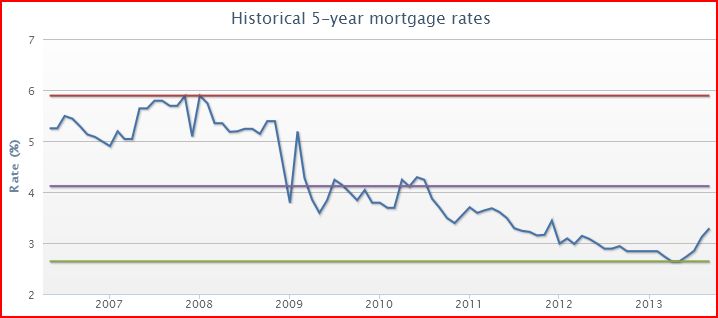Rising mortgage rates in Canada?
Rising mortgage rates in have been discussed for quite some time. As you may or may not know, mortgage rates in Canada are tied to Bank of Canada lending rate - banks borrow their money from Bank of Canada, and then turn around and lend money to you and me. Of course, they charge a bit extra - after all, they’re in business of making money, not simply passing it around. Once you understand this, it’s easy to understand that Bank of Canada lending rate is tied to mortgage rates in general. If Bank of Canada brings their rate up, almost all banks follow the trend and raise their rates - because they don’t want to lose money. Three days ago, Bank of Canada made an announcement that interest rates will be staying where they’re now for now.
But it’s important to understand that currently mortgage rates (and other lending rates) are at historical lows. If you ever talk to old-timers, they’ll remember the rates being in double digits - 15-20%. Rates have been falling over the years - and with last recession Bank of Canada cut them to never-seen-before levels. Where will they go from here? I think it’s safe to say that they have nowhere to go but up. The economy is coming around, and sooner or later our government will have to do something to prevent it from running away again - and interest rates is one of the ways control it.
What are you paying now in interest?
If you ask somebody about their mortgage rates, they’ll probably respond “Oh, I’m paying around 3% currently”. People who pay a bit more attention to their finances will say “My monthly mortgage payment is $1200”. Somebody who is borderline obsessed with personal finance (that would be me) will say “My by-weekly mortgage payment is $495.17, and I pay my bank 3.89%!”.
Your mortgage payment consists of two parts - principal repayment (amount that goes towards paying off the house) and interest payment (amount the bank gets for lending you money). Lumped together is the amount leaving your bank account every month (or by-weekly if you’re on by-weekly payments). If you ever want to get depressed quickly, ask your bank how much of that amount is interest and how much goes towards the principal. Just because I had nothing to do, I called my bank:
$157.99 Principal Payment + $337.17 Interest Payment = $498.16 Mortgage Payment (by-weekly)
Good god, somebody give me some wine. My mortgage payment is mostly interest charges! No wonder banks have such nice buildings.
What happens if the mortgage rates double?
Currently we’re paying 3.89% on our mortgage - which was a good rate when we bought our little home, not so good right now. Historical average for mortgage rates over the last 30-40 years is actually closer to 8 percent, or roughly double what it is right now for us personally. In two years, we’ll have to refinance our mortgage since our 5-year term will be up - but what kind of rate will we get? And with all the talk about rising mortgage rates in Canada - I got curious and decided to do some math.
Quick and dirty math on our mortgage payment if our rates double. The real number would be slightly off - because by that time our mortgage amount would be lower but that’s why I call it quick and dirty:
$157.99 Principal Payment + $674.34 Interest Payment = $832.33 Mortgage Payment (by-weekly)
Good god, I need more wine. If the interest rates indeed double in two years, our mortgage payment will be over $800 (by-weekly) - which means we’ll be paying over $1600/month.
Can we afford it? Well, it will certainly put a break on our saving rates - currently we’re saving quite a bit for the future as many financial advisors recommend. If the mortgage rates double (and I doubt our income will do the same thing unless I start removing my clothes for money), most of the increase will have to come from the money we’re currently saving. The result? Less money being saved for the future, less money for consumption, and a whole lot of wine being bought.
How will rising mortgage rates affect you personally?
Ask yourself few questions - what is your current mortgage rate? How much are you paying in interest and principal payments? What happens if mortgage rates return to their historical average, will you be able to afford your house? Will you have to adjust your life?
While many people might be scared of rising mortgage rates in Canada, one thing you can do to punch fear in the face is to educate yourself. At least once you know your situation and facts, you can make an educated decision to worry about them - or not.
Once you educate yourself, you can look at some options - refinancing your mortgage to lock into current rates or even extending your mortgage term to 10 years. You can also increase your current principal payment and accelerate your mortgage repayment - this way your principal amount is lower when you’re refinancing.
